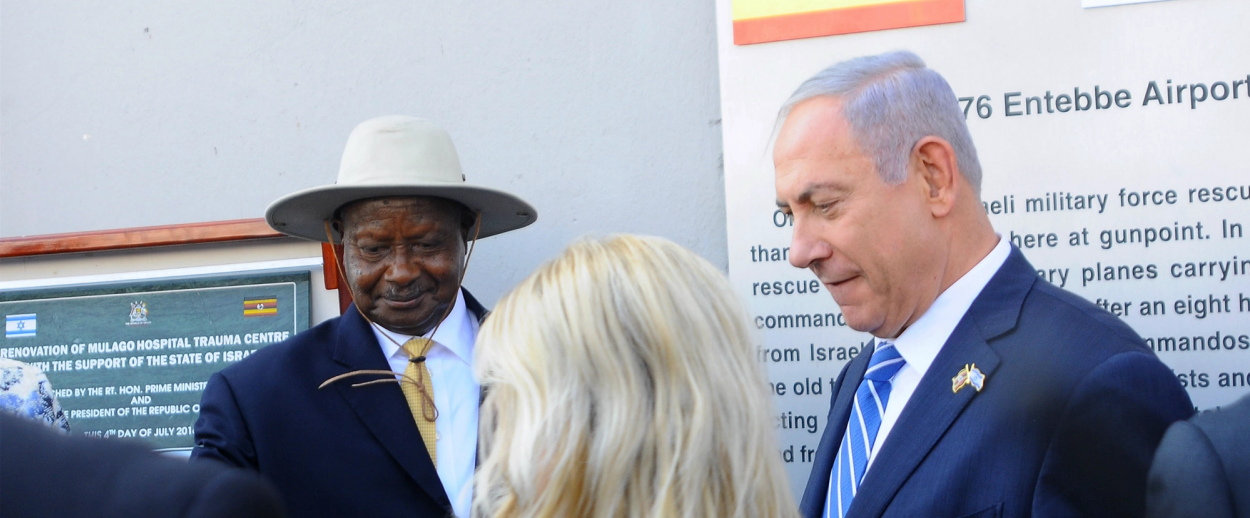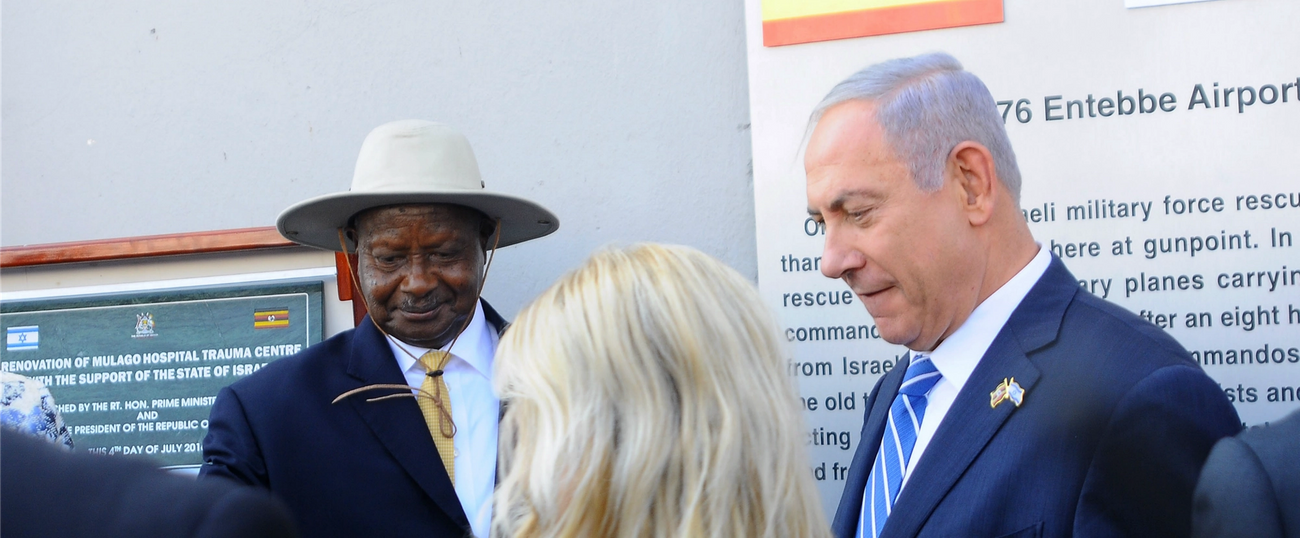Bibi Tours Africa
The Israeli Prime Minister’s slate of diplomatic meetings includes visits to Kenya, Ethiopia, Rwanda, and Uganda, where he commemorated the 40th anniversary of the Israeli raid at Entebbe




Prime Minister Benjamin Netanyahu’s ongoing visit to four sub-Saharan African countries got off to an awkward start on July 4, when 71-year-old Ugandan dictator Yoweri Museveni gave a puttering and gaffe-filled speech at Entebbe Airport to commemorate the 40th anniversary of the successful Israeli raid that ended a hostage crisis there.
Speaking in front of six other African leaders and Israeli Prime Minister Benjamin Netanyahu, Museveni forgot the name of former Iranian president Mahmoud Ahmadinejad, appeared to have only faint idea what the Balfour Declaration was, and referred to Israel as Palestine more than once. Museveni’s laughter after saying that “we’d be fighting you now” if the Jews had ended up settling in Uganda—as was seriously proposed in 1903—was good-natured, though it came across somewhat ominously. Israeli Prime Minister Benjamin Netanyahu smiled throughout Musevni’s speech, and when it was his turn to speak, he thanked Museveni for the invitation to visit the country, and praised him as a staunch ally in the fight against terrorism.
Irrespective of whatever subsequent cringe-inducing statecraft he will have to endure, Netanyahu’s trip to Africa this month, which also includes visits to Kenya, Ethiopia and Rwanda, continues his country’s unlikely diplomatic hot-streak. Amid a June cabinet shakeup that moved Netanyahu’s government even further to the right, years of stasis in the Israeli-Palestinian peace process, and sustained instability on Israel’s northern and southern borders, the country’s strategists and diplomats have mended relations with Turkey and reached a canny understanding with Russia.
Netanyahu’s Africa visit continues the pattern: Look past the weirdness of Musevini’s speech, and you’ll find fresh reports of Israeli diplomats meeting with their Somali counterparts, a breakthrough in relations with a straetgically located Arab League member that doesn’t even recognize Israel’s right to exist. A Times of Israel report noted that when asked, Netanyahu wouldn’t confirm or deny that he had secretly met with Somalia’s president. Netanyahu is reportedly going to visit Kenya during his trip—a country that borders Somalia and that has long been used as a secure location for high-level Somalia-related diplomacy.
Netanyahu’s Africa visit reveals a potentially unsettling truth about Israeli diplomacy, and about diplomacy conducted by any small, vulnerable or overmatched state. While Kenya is an energetic democracy and east Africa’s political and economic leader, Rwanda and Ethiopia are heavy-handed and technocratic dictatorships whose regimes have built friendly ties with western democracies by delivering high growth-rates and fostering a reputation for responsible stewardship of foreign aid money. Musevini has been in power for 30 years; like president Paul Kagame in Rwanda, he has a history of military adventurism and internal oppression. Israel also has a complicated history with both Ethiopia and Rwanda, and specifically with the governments that the current Ethiopian and Rwanda regimes forcibly replaced. In the mid-1980s, Israel was suspected of providing weapons and other forms of military assistance to Ethiopia’s beleaguered communist regime, in exchange for allowing Israel to evacuate 8,000 Ethiopian-Jewish refugees to Tel Aviv. The Tigrayan People’s Liberation Front, the forerunner of the current Ethiopian regime, overthrew the Derg in 1991. And Israel allegedly helped arm the government of Rwanda’s Juvenal Habryrimana, which launched a genocide against the country’s Tutsi citizens in mid-1994 that stopped only when Kagame’s Tutsi militia overthrew the majority-Hutu dictatorship.
The regimes with which Netanyahu is visiting this month aren’t the most savory of friends—and they’re governments whose leaders were on the opposite side of past Israeli policies before they took power. But Israel is always looking for new international partners, and emerging African economies are in need of the kind of cutting-edge technology, development, and security assistance that Israel is uniquely positioned to provide. Netanyahu’s Africa visit represents the fruits of diplomatic pragmatism—surface-level awkwardness aside.
Previous: Why Turkey Needed To Reconcile Its Ties With Israel
Why Israel and Russia’s Relationship Continues to Warm
Related: Why Bibi’s Visits to Moscow Mean Bad News for Israel
Armin Rosen is a staff writer for Tablet Magazine.